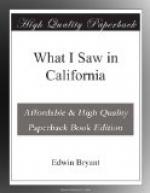We left Los Angeles late in the afternoon of the 29th of January, with two Indian vaqueros, on miserable broken-down horses (the best we could obtain), and encamped at the deserted rancho at the foot of Couenga plain, where the treaty of peace had been concluded. After we had been here some time, two Indians came to the house, who had been sent by the proprietor of the rancho to herd the cattle. Having nothing to eat with us, a tempting offer prevailed upon the Indians to milk one of the cows; and we made our supper and our breakfast next morning on milk. Both of our Indian vaqueros deserted in the night, carrying with them sundry articles of clothing placed in their charge. A few days have made a great change in the appearance of the country. The fresh grass is now several inches in height, and many flowers are in bloom. The sky is bright, and the temperature is delightful.
On the 30th of January, leaving the mission of San Fernando on our right, at a distance of eight or ten miles, we followed the usually travelled trail next to the hills, on the western side of the plain. As we were passing near a rancho, a well-dressed Californian rode out to us, and, after examining the horses of our miserable caballada, politely claimed one of them as his property. He was told that the horse was drawn from the public caballada, at Los Angeles, and could not be given up. This seemed to satisfy him. After some further conversation, he informed us, that he was Don Andres Pico, the late leader and general of the Californians. The expression of his countenance is intelligent and prepossessing, and his address and manners courteous and pleasing. Shaking hands, and bidding us a very earnest adios, he put spurs to his horse and galloped away.
We were soon after overtaken by a young Californian, who appeared at first rather doubtful whether or not he should make our acquaintance. The ice being broken, however, he became very loquacious and communicative. He stated that he was returning to his home near Santa Barbara, from the wars, in which he had been engaged against his will. The language that he used was, that he, with many others of his acquaintances, were forced to take up arms by the leading men of the country. He was in the two battles of the 8th and 9th of January, below Los Angeles; and he desired never to be in any more battles. He was heartily rejoiced that there was peace, and hoped that there would never be any more wars. He travelled along with us until afternoon, when he fell behind, and we did not see him again until the next day.




